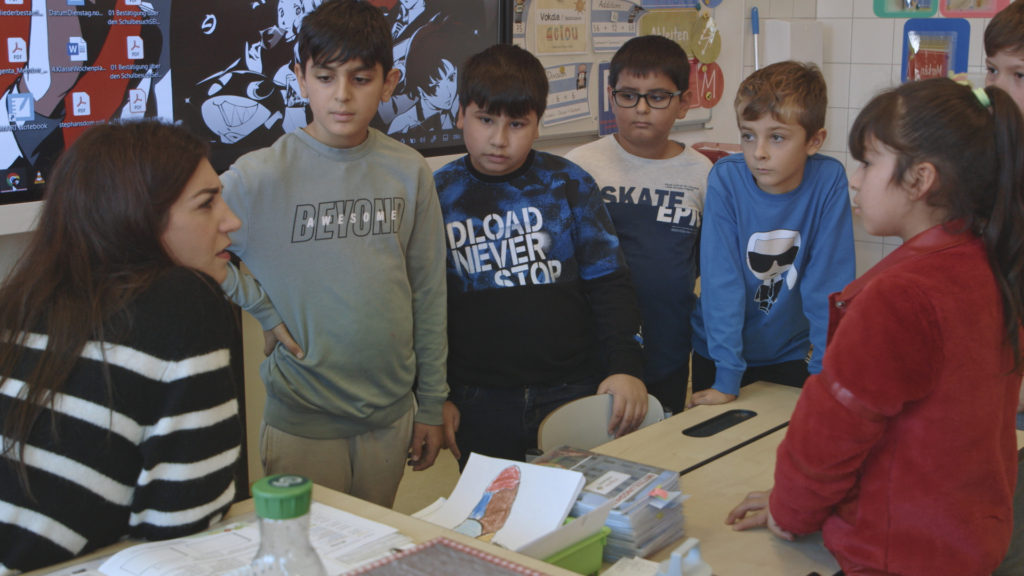Berlinale review: Favoriten (2024) by Ruth Beckermann

©Ruth Beckermann Filmproduktion
I am a proud citizen of “Favoriten”, Vienna’s most populated district and its probably largest melting pot, and I have sworn to myself to spend the rest of my life in it. To be fair, my first impressions of Favoriten when we moved to our cooperative housing apartment back in 2010 wasn’t that great. Used to the so called “Gürtel” (town center) area, I was sick with nostalgia, and everything bugged me, like the lack of neat coffee houses, cinemas, cultural institutions, and its unpolished look. After so many years spent there, if you asked me now if I could imagine my life anywhere else – I would answer with a raised eyebrow and a “why?”
One year into my Favoriten existence, I began to pay attention to two distinctive dialects, but not quite on my own. My son, who was barely three years old, pointed a finger at a young family on the tram one day, saying in a typically loud toddler’s voice: “Mommy, what is the language these people are speaking?” To my big astonishment I picked up a wild mix of Serbian and German, grammatically adapted to the first. This phenomena that I baptized “Seutsch” (Serbisch-Deutsch) or “Derbisch” (Deutsch-Serbisch) doesn’t uniquely apply to the first and second generation of guest workers from my motherland, but it exists in countless linguistic forms depending on the origin of people living in the neighbourhood.
The other very specific language of Favoriten is the one spoken by the Austrians who have been born and raised in the district, and who have kept a parcticual version of the old Viennese dialect, the one that could be heard on the state television before it became popular to adapt to German standards for the purpose of a larger viewership. Here, my son’s name is pronounced with velarization which is one of the things that I have been keen to learn since 12 years, to no avail. I’ve been practicing it with my tobacconist, a typical grumpy Viennese guy with smoke-stained moustache and mullet. He is not happy with my progress.
My next discovery was that Favoriten had everything I thought it didn’t (also the historic buildings), but not in the part where I live, which is – mainly very white Austrian. All the fun is a bit further up direction town, where – as we like to say here “no one can die of hunger or thurst”. It is also an area where German is the least spoken language. The businesses are being run in Serbian/ Croatian/ Bosnian, Turkish, Arabic, Albanian, Romanian, Chechen, Mandarin, Farsi and Urdu, among others.

Ruth Beckermann’s Encounters opener Favoriten is entirely shot in Vienna’s largest primary school situated in the district it owns its name to. The Austrian helmer spent three years (2020-2023) following a class of twenty five pupils from age seven to ten (from second to fourth grade), and their dedicated, supportive teacher Ilkay Idiskut, who is of the kind we wish we had when we were kids: funny, patient, knowledgable and respectful, and at the same time a person of authority who knows how to set boundaries without as much as a raised voice. Watching her at work, teaching seems like the easiest job in the world, which of course it isn’t, especially in an Austrian primary school where one teacher is in charge of all subjects tought in the class for four years, including English and physical education. It doesn’t help that schools are generally understaffed and many useful initiatives such as extra German classes for non-native speakers aren’t offered anymore due to lack of funding. At one point, we are let into a teachers’ meeting to eavesdrop on shortcomings of the Austrial educational system. For anyone living here, this is not news. Schools have been fighting to find people for teaching positions since over a decade. Simply put, not many are ready to take a great responsibility for education of new generations of pupils for small wages and barely acceptable working conditions.
Ilkay’s class is as colourful as Favoriten itself, comprising of children who mainly hail from migrant families from former Yugoslavia, Turkey, Albania, Syria and many other countries. Instead of highlighting their background, Beckermann is interested in the class dynamics and children who as fully formed individuals, interact with lightness of small people unburdened by the problems that start occuring later in the puberty. With the fly-on-the-wall approach, she shows their gradual transition from wide-eyed beginners who learn simple lessons through creative assignments, to their first encounters with additions and German texts. Step by step, we get to know their personalities, but we also learn about their families through one of Ilkay’s methods to encourage the German language practice. What we also get to know except what their fathers and mothers do for a living, is that they have completely different plans for their own future. Dreaming big is what they all have in common.
The connnection with the children in Favoriten is immediate, hugely influenced by excellent choices made by Beckermann and the director of photography Johannes Hammel who shot the film with a hand-held camera at child eye’s level. We are in the middle of action, close to the teacher and her young brood ready to spread their wings. If this documentary were done by someone less invested in curious, unbiased investigation of reality, it would turn into a political commentary. But, Beckermann’s gaze is sober, and not didactic in the slightest, which is a step away from what we know from some films from her previous body of work. Given a very different nature of the subject matter in Favoriten, nothing else would be expected from the seasoned filmmaker with the high ability to feel the pulse of people she either works with, or traces their life trail.
At one point, children are given the oportunity to become an active part of the film by taking their own footage with IPhones they were gifted by the director. While filming, they discover a new form of curiosity for each other, asking questions about the present and future. Favoriten is a firework of shiny ideas and optimism, with great chances of conquering the world.
Original Title: Favoriten
Country: Austria
Runtime: 118′
Written by: Ruth Beckermann & Elisabeth Menasse
Directed by: Ruth Beckermann
Director’s Assistant: Elisabeth Menasse
Production: Ruth Beckermann Filmproduktion
Production Manager: Rebecca Hirneise
Production Assistant: Jana Waldhör
DoP: Johannes Hammel
Sound: Andreas Hamza
Editing: Dieter Pichler
Editing Assistant: Eva Rammesmayer
Cast: Nerjiss Aldebi, Liemar Aljouma, Egemen Ak, Majeda Alshammaa, Enes Kerim Bölüktaş, Melisa Bulduk, Furkan Çongar,
Dani Crnkić, Eda Dzhemal, Beid Emini, Arian Grošić, Elif Gürdal, Rebeca Harambaşa, Ibrahim Ibrahimovič, Alper Ismetov,
Davut Kaplan, Manessa Lakha, Mohammed Maksoud, Selen Mehmedova, Selin Mehmedova, Teodora Mladenović,
Hafsa Polat, Natalia Sălăgean, Danilo Tomić, David Tomic, Amina Tungaev, Valentin Vujcic, Fatima Yapici, Ilkay Idiskut
















